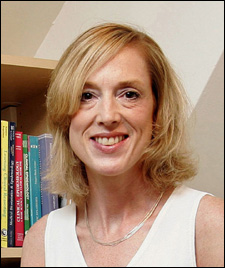MacArthur ‘Genius’ Grant awarded to Goldie
Physician, researcher applies decision science to global women’s health

Goldie develops and validates computer-based models linking the basic biology of a disease and its epidemiology to outcomes in large populations. Her focus in the past several years has been on three viruses of major public health importance: HIV, hepatitis, and the human papilloma virus (HPV). Collectively, these three viruses – together with the conditions they lead to (AIDS, liver cancer, and cervical cancer, respectively) – are responsible for an enormous burden of disease, have a substantial impact on quality of life, are associated with both high medical and societal costs, and represent important public health challenges for low-, middle-, and upper-income countries.
The John D. and Catherine T. MacArthur Foundation Tuesday (Sept. 20) named 25 new MacArthur Fellows for 2005, including Goldie.
In recent years, Goldie has concentrated her efforts on identifying effective and cost-effective strategies to reduce the burden of cervical cancer, the most common cause of cancer death in women worldwide. She has adapted her biological disease model of HPV to a range of epidemiological settings in order to address the most relevant questions for cervical cancer control in different parts of the world. Her work has informed cervical cancer screening guidelines in several countries, has contributed to timely policy issues and debates in the national and international arena around the potential of HPV vaccination, and has catalyzed key changes in how public health leaders approach screening in the poorest countries.
For example, she has conducted several landmark analyses showing the promise of screening women once or twice in their lifetime using HPV DNA testing or simple visual screening methods followed by treatment of precancerous lesions. In comparison with conventional Pap smears, these strategies rely on fewer visits, can be delivered by nonphysicians, and offer cost-effective and more sustainable options for resource-poor settings. In short, they have the potential to cut cervical cancer deaths globally by one-third. Goldie and colleagues have applied their work internationally, including modeling of HPV vaccination in Costa Rica, and development of effective cervical health screening policies in a wide range of countries including Kenya, South Africa, Thailand, India, Peru, Haiti, Brazil, and Tanzania.
Goldie’s faculty research page
The mathematical models she constructs differ from many models used for cost-effectiveness analysis in that they are “biologically based,” hewing closely to the underlying disease process as it unfolds, while remaining consistent with observed epidemiological data. They extend information available from observational studies by extrapolating patterns beyond the time horizon of a single study, and can be used to evaluate strategies in a wide range of settings. In addition to relating biological and clinical information, these mathematical models can provide quantitative insight into the relative importance of different components of the prevention or treatment process. Also, the models allow investigation of how results will change if values of key parameters are varied. By identifying the most influential parameters, Goldie can identify key information gaps and prioritize and guide data-collection efforts.
“I am enormously honored to have received this award,” said Goldie. “As a physician trained in inner-city medical care, I have always been passionate about the power of public health and the power of science to make a difference. I consider it my responsibility to think hard about the best way I can leverage this support from the MacArthur Foundation to continue making a difference. That is what my work is about.”
– HSPH Office of Communications




